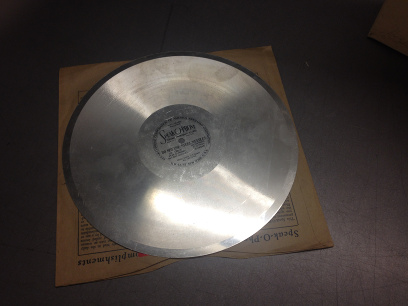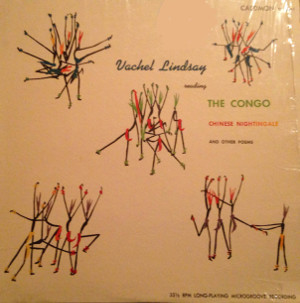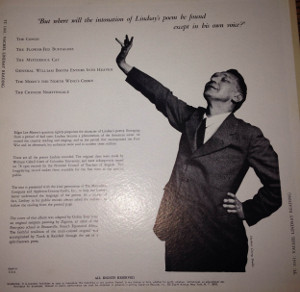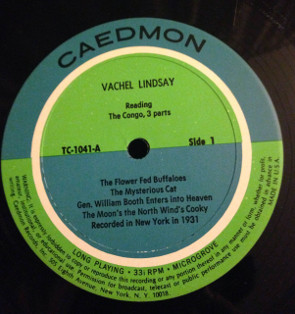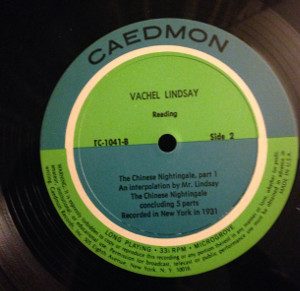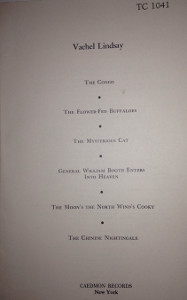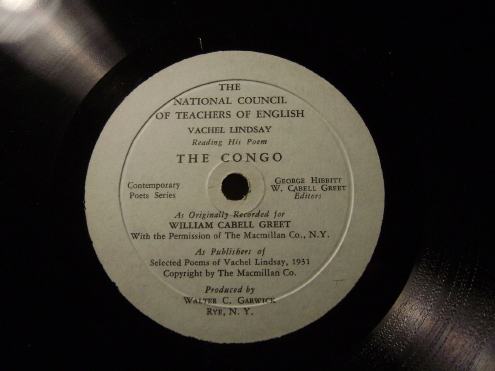|
|
Vachel Lindsay
PennSound Lindsay page editor: Chris Mustazza
The W. Cabell Greet Recordings: Reading at Columbia University, 1931
These recordings were made in 1931 at Columbia University, recorded by Barnard professor W. Cabell Greet, a lexicologist and scholar of American dialects.
For more information see Mustazza on The Contemporary Poets Series in Jacket2 and Mustazza's "Vachel Lindsay and The W. Cabell Greet Recordings" in the Chicago Review.
PennSound wishes to thank the staff at Columbia's Rare Book & Manuscript Library, especially Thai Jones, Jennifer Lee, and Karla Nielsen, for helping us to make these recordings available.
Editor's note: The recordings here were originally made on aluminum platters. They were subsequently dubbed to reel-to-reel tapes by the Library of Congress in the 1970s. These digitizations are made from the reels, which are stored at Columbia University. I made the decision to present the recordings in the order in which Columbia
numbered the aluminum platters, which may or may not be the same sequence used by Greet and Lindsay, except for where I reordered them to keep parts of the same poem together. Sequence numbers, as well as record numbers, are available in the file names. I also removed files which were clearly duplicates, but included some files as alternate takes, where I could not confirm whether the file was a duplicate or not. --Chris Mustazza, University of Pennsylvania
- The Silver Ships (2:20) [note 1]
- The Jazz of This Hotel (1:06)
- How Dulcinea Del Toboso is Like the Left Wing of a Bird (2:00)
- A Dirge for a Righteous Kitten (0:59)
- The Sea Serpent Chantey
- Poem (2:59)
- Fragment (3:24)
- Daniel [note 2]
- Part 1 (3:40)
- Part 2 (1:05)
- Part 1 (alternate reading) (2:29)
- Part 2 (alternate reading) (2:44)
- The Virginians Are Coming Again
- Part 1 (2:43)
- Part 2 (3:10)
- Part 2, alternate take (2:41)
- The Chinese Nightingale
- Part 1 (2:16)
- Part 2 (2:41)
- part 3 missing [note 3]
- Part 4 (2:29)
- Part 5 (2:44)
- Part 5, alternate take (2:51)
- comments on performance (0:39)
- The Congo - fragments
- Sections I and part of II (3:08)
- Sections II and part of III (3:21)
- Sections I and part of II (5:35)
- Section III (3:00)
- fragment of Section III (4:01)
- Section II (2:52)
- Section III (in media res) (2:50)
- The Congo - complete reading
- Part I (2:44)
- Part II (3:00)
- Part III (3:02)
- Comments on the phonotext (0:32) [note 4]
- The Congo - complete, alternate version [note 5]
- The Congo, Sections I and II (5:42)
- The Congo, Section III (2:58)
"The Congo" is also featured on PoemTalk Episode 26.
- Kansas
- Version 1 (2:27) [note 6]
- Version 2 (2:35) [note 7]
- Version 3 (2:37) [note 8]
- General William Booth Enters Into Heaven
- Full poem (3:35)
- Fragment (1:21)
- Comments (0:24)
- The Moon's the North Wind's Cooky (0:42) [note 9]
- Yet Gentle Will the Griffin Be (0:45) [note 9]
- John L. Sullivan, The Strong Boy of Boston
- Part I (3:31)
- Part II (2:17)
- Comments (0:30)
- John L. Sullivan, The Strong Boy of Boston, complete reading (5:50)
- John L. Sullivan, The Strong Boy of Boston, complete reading (5:50) [note 10]
- The Ezekiel Chant (3:45) [note 11]
- King Solomon and the Queen of Sheba (Part III of the Booker Washington Trilogy from The Chinese Nightingale and Other Poems)
- Comments on the poem (0:21)
- Part 1 (2:51)
- Part 2 (3:23) [note 12]
- Part 3 (2:57)
- Part 4 (2:38) [note 13]
- Part 5 (3:27) [note 14]
- Part 5 (alternate take) (3:14) [note 15]
- How Samson Bore Away the Gates of Gaza
- Part 1 (3:05) [note 16]
- Part 2 (2:45)
- Part 1 (alternate reading) (2:49)
- Part 2 (alternate reading), fragment (3:41) [note 17]
- Simon Legree (Part I of the Booker Washington Trilogy from The Chinese Nightingale and Other Poems)
- Part 1 (3:34)
- Part 2 (2:10)
- The Mysterious Cat (1:15) [note 18]
- John Brown (Part II of the Booker Washington Trilogy from The Chinese Nightingale and Other Poems)
- Part 1 (2:59)
- Part 2 (2:29)
- Fragment (3:35)
- Fragment (3:44) [note 19]
- Euclid (0:51) (from a collection of poems titled Moon Poems for the Children/Fairy-tales for the Children, published in The Congo and Other Poems) [note 20]
- In Praise of Johnny Appleseed
- Part 1 (3:21)
- Part 2 (3:26)
- Part 3 (3:28)
- Part 4, fragment (4:12) [note 21]
- The Santa Fe Trail
- Part 1 (3:21) [note 22]
- Part 2 (3:11) [note 23]
- Part 3 (3:27) [note 24]
- Bryan, Bryan, Bryan, Bryan
- Part 1 (3:27)
- Part 2 (3:37)
- Part 3 (3:19)
- Part 4 (3:05)
- Part 5 (2:55)
- Comments on the poem (0:29)
- Hamlet
- Part 1 (3:05)
- Part 2 (1:28)
- The Traveller-Heart (2:01) [note 25]
- I Know All This When Gipsy Fiddles Cry
- Part 1 (3:36)
- Part 2 (2:47)
- Part 3 (3:36)
- Part 4 (1:01)
- A Swan Is Like a Moon to Me [note 26]
- Poem (1:44)
- Comments on the poem (0:26)
- The Golden Whales of California
- Part 1 (3:15)
- Part 2 (3:27)
- Part 3 (3:18)
- Every Soul Is A Circus (fragment) [note 27]
- Part 1 (3:08)
- Part 2 (3:19)
- Part 3 (3:28)
- The Blacksmith's Serenade
- Part 1 (3:34)
- Part 2 (2:32)
- Comments on the poem (0:37)
- The Ghosts of the Buffaloes
- Part 1 (3:32)
- Part 2 (2:19)
- Comments on the poem (0:35)
- A Doll's "Arabian Nights"
- Part 1 (3:30)
- Part 2 (3:38)
- Ballad On How To Write A Poem
- Part 1 (3:29)
- Part 2 (1:18)
- The Locomotive Dragon-Hippogriff [note 28]
- Poem (2:02)
- Comments on the poem (0:18)
- "Mister Chipmunk" and "Two Old Crows" [note 29]
- Mister Chipmunk (2:01)
- Two Old Crows (1:12)
- Comments on the poems (0:27)
Notes
- Note 1: The poem Lindsay here titles "The Silver Ships" represents a rearrangement of a poem titled "The Lame Boy and the Fairy," which appears in The Golden Whales of California and Other Rhymes in the American Language.
- Note 2: "Daniel" has also been published as "The Daniel Jazz."
- Note 3: Record 303 from the collection appears to be missing. Given that the record falls between performances of parts 2 and 4 of "The Chinese Nightingale," perhaps the third part of the poem is located on this record.
- Note 4: The comments were appended to the B-side of record 307, following Section II of "The Congo."
- Note 5: I group these parts together into a whole because, like the previous complete version of "The Congo," they represent the entire poem, read in adjacent (vis-a-vis their placement on the records) segements.
- Note 6: This version of "Kansas" is located on record 306B, appended to a fragment of the "The Congo." Its placement here is curious, as it interrupts abruptly a series of readings of parts of the "The Congo."
- Note 7: This version of "Kansas" is quite possibly a copy of the first version. I include it because it was located on another record, the A-side of 309. Like the previous version, it also interrupts a series of readings of parts of "The Congo," though less abruptly, as this version gets its own side of a record.
- Note 8: Like the first version of "Kansas," this version also appears appended to a recording of the third section of "The Congo," albeit on the B-side of record 310, raising the question of whether the entire side of this record is a dub of the B-side of record 306. In support of this, the A-side of record 310 appears to be the same as the A-side of record 306, so perhaps the entire record is a duplicate.
- Note 9: Both "The Moon's the North Wind's Cooky" and "Yet Gentle Will the Griffin Be" are appended to the end of the fragment of "General William Booth Enters Into Heaven," on the A-side of record 312. The B-side returns to the original poem, with a complete reading of "General William Booth Enters Into Heaven."
- Note 10: This version of "John L. Sullivan" seems to be identical to the previous full version, but it appears on the opposite side of the same record. I include it here in the event that it differs, and to note the fact of its appearance on both sides of the same record.
- Note 11: See a scan of "The Ezekiel Chant" with accompanying illustration by Lindsay here.
- Note 12: If you listen carefully to the very end of this file, you can hear Lindsay ask the recording engineer "alright?" to ensure that the take was good. Given how mimetic this particular "poem-game" is, the comment marks an aesthetically interesting shift in modes, from stage to backstage, if you will.
- Note 13: Here, again, we can hear some Lindsay's discourse with the recording engineer, likely Walter C. Garwick, as Lindsay asks "Was that better?" It's unclear if this question implies that they did multiple takes of the same part of the poem (only this one exists in the archive) or if he's asking if this reading was better than the reading of the previous section of the poem.
- Note 14: Again, at the end of this recording, we hear a comment from Lindsay. It sounds like he says "grand chorus," perhaps in celebration of the finale of the performance, which ends on a "chorus."
- Note 15: This appears to be another take of part 5. It covers the same text covered by the previous version, but it sounds different, e.g. there is no commentary by Lindsay at the end. This raises the question of whether there were other alternate takes that didn't make it into the archive. See previous note.
- Note 16: We can hear a false start at the beginning of this recording, before it starts over. Perhaps another take was started on the same record.
- Note 17: This reading is a fragment because, in an unfortunate irony and collision of medium and content, the recording cuts off as Lindsay says "cut off" toward the end of the poem.
- Note 18: "The Mysterious Cat" is appended to the B-side of record 321, following the second part of "Simon Legree."
- Note 19: This fragment is a nearly complete reading of the poem. We can hear a mechanical error at the end, which trunctes the last couple of lines of the poem. As with all audio errors in this collection, we can't be sure whether they originate from a problem with the original recordings or with one of the transcodings.
- Note 20: "Euclid" appears appended to B-side of record 322, following the second part of "John Brown." The poem is part of a series of poems on the moon, "one of about 200," as Lindsay remarks in the recording.
- Note 21: While part 4 of "In Praise of Johnny Appleseed" nearly completes the poem, it cuts off toward the end of the file into a skipping record sound. It's unclear if this was an issue with the digitization to reels (i.e. skipping during playback) or with the original recording.
- Note 22: This record, the A-side of 326, that contains readings of the "The Santa Fe Trail" is mislabled as containing "Johnny Appleseed" ("In Praise of Johnny Appleseed") and "Kallyope" ("The Kallyope Yell"). Also of note in this recording is the faint ringing of a telephone in the background of the recording, around 2:12. Finally, it's worth noting that, while the recording appears to cut off at the end, the next record picks up at the same line. So I do not reference this recording as a "fragment." An identical recording (as shown by the telephone ring and ostensible cut-off at the end) appears on the A-side of record 327. I include the copy from 326 only.
- Note 23: This record, the B-side of 326, is also mislabled. The Library of Congress metadata (as spoken by the engineer dubbing the record to reels) states that the record contains "Kallyope" ("The Kallyope Yell"), "The Flower-Fed Buffaloes," and "When I Was a Tree" (the latter from Going-to-the-Stars). An identical recording appears on the B-side of record 327. I include the copy from 326 only. This, paired with the previous note, implies that the same record was digitized twice. It's unclear where this error occurred, but it could imply that recordings were lost, including "The Kallyope Yell" and "When I Was a Tree," which do not appear in this collection. "The Flower-Fed Buffaloes" appears on the Caedmon record (below) but not here, which means that it was recorded during this session.
- Note 24: While there is some slight overlap between parts 2 and 3, I present the series as a complete poem because the three parts, taken together, comprise the entire poem.
- Note 25: The Library of Congress metadata (as spoken by the engineer dubbing the record to reels) erroneously calls this poem "The Troubled Heart." It's unclear whether this was written on the record or whether the audio engineer made the error. This recording very slightly cuts off at the end in a mechanical error.
- Note 26: These recordings are located on the B-side of record 333, following part 4 of "I Know All This When Gipsy Fiddles Cry."
- Note 27: These recordings comprise a fragment of the poem, as the end of the poem is missing. It's also worth nothing that part 3 precedes parts 1 and 2 according to Columbia's record numbers. I've numbered the recordings (in the file names) according to their chronology on the records, but present them on the page in the order called for by the text of the poem.
- Note 28: These recordings are located on the B-side of record 340, following the second part of "Ballad On How To Write A Poem."
- Note 29: I've grouped these recordings together becuase Lindsay's comments (included here) playfully imply a relation between the poems. Too, they exist on the same side of the same record, which when taken with the comments, seems to imply that they go together. The comments also reference a "swan," which could possibly be the recordings of "A Swan is Like a Moon to Me," included in this collection.
Caedmon Record
These recordings were digitized from Caedmon record TC 1041 (images included here). Before being distributed by Caedmon, the recordings appeared on an LP distributed by the National Council of Teachers of English (an image is provided below for reference).
The original discs were made by William Cabell Greet of Columbia University--original recordings available above.
Vachel Lindsay and Wallace Stevens Centennial Observance, Library of Congress, November 27, 1979
"A. Walton Litz delivers a lecture, Wallace Stevens, the poetry of earth, in which he discusses the real and particular aspects of Stevens's poems and the influence of place and time on the poet's work. Anthony Howard follows with readings of ten poems by Vachel Lindsay." - Library of Congress Catalog
Complete recording (1:14:30): MP3
Poemtalk #26, discussing Vachel Lindsay's "The Congo," October 30, 2009
Listen to the complete recording and read program notes for the episode at Jacket2.
These sound recordings are being made available for noncommercial and educational use only.
© 2005 Estate of Vachel Lindsay. Used with the permisson of Nicholas Cave Lindsay.
Distributed by PennSound.
|

